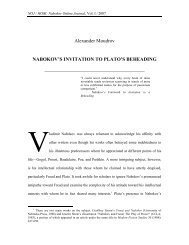domesticated translation: the case of nabokov's translation of alice's
domesticated translation: the case of nabokov's translation of alice's
domesticated translation: the case of nabokov's translation of alice's
You also want an ePaper? Increase the reach of your titles
YUMPU automatically turns print PDFs into web optimized ePapers that Google loves.
N. Vid. “Domesticated Translation”<br />
It is impossible to preserve <strong>the</strong>se allusions in Russian without an extensive<br />
commentary. Thus, Nabokov decided to completely erase any hint <strong>of</strong> reference to real<br />
persons in order to avoid additional explanations which would only intensify <strong>the</strong><br />
incomprehensibility <strong>of</strong> <strong>the</strong> text. He translated “Duck” literally as “utka” (“duck”),<br />
“Dodo” as “Dront” (it is known as an extinct bird in Russian culture), “Eaglet” as<br />
“orlenok” (a diminutive <strong>of</strong> <strong>the</strong> Russian word for “eagle” – “orel”) and only “Lori”<br />
remained “Lori”, as in <strong>the</strong> original.<br />
The connotations <strong>of</strong> <strong>the</strong> <strong>translation</strong> <strong>of</strong> “Cheshire Cat,” which is renamed<br />
“Maslianichnyi Kot” (“Butter Cat”), are explained in Demurova’s study (2003: 186).<br />
“Maslianitsa” (“Butter Day”) is a third preparatory week, a religious holiday, when<br />
people usually eat pancakes. There is also a famous proverb in Russian – “a cat can not<br />
have Maslyanica <strong>the</strong> whole time” (ne vse kotu Maslianitsa), meaning that a man can not<br />
simply enjoy himself all <strong>the</strong> time but must eventually get to work. This proverb is also<br />
used in <strong>the</strong> <strong>translation</strong> to explain <strong>the</strong> significance <strong>of</strong> <strong>the</strong> Cat’s name. However, some <strong>of</strong><br />
<strong>the</strong> names are literal <strong>translation</strong>s, 9 such as “Hatter” and “March Hare,” which in <strong>the</strong><br />
original allude to idiomatic expressions “as mad as a Hatter” and “as mad as a March<br />
Hare” but have no direct equivalents in <strong>the</strong> Russian language (Demurova 2003: 187). The<br />
idea <strong>of</strong> hares which are mad in March could evoke certain associations in Russian<br />
readers, but <strong>the</strong> idea <strong>of</strong> a hatter being mad had no equivalent in Russian. The meaning<br />
implied in <strong>the</strong> original was lost due to <strong>the</strong> literal <strong>translation</strong>, but in this <strong>case</strong> Nabokov did<br />
not have a choice.<br />
TRANSLATING PUNS<br />
9 “White Rabbit” and “Caterpillar” as well as “Gryphon” and “Pigeon” are also translated literally.
















